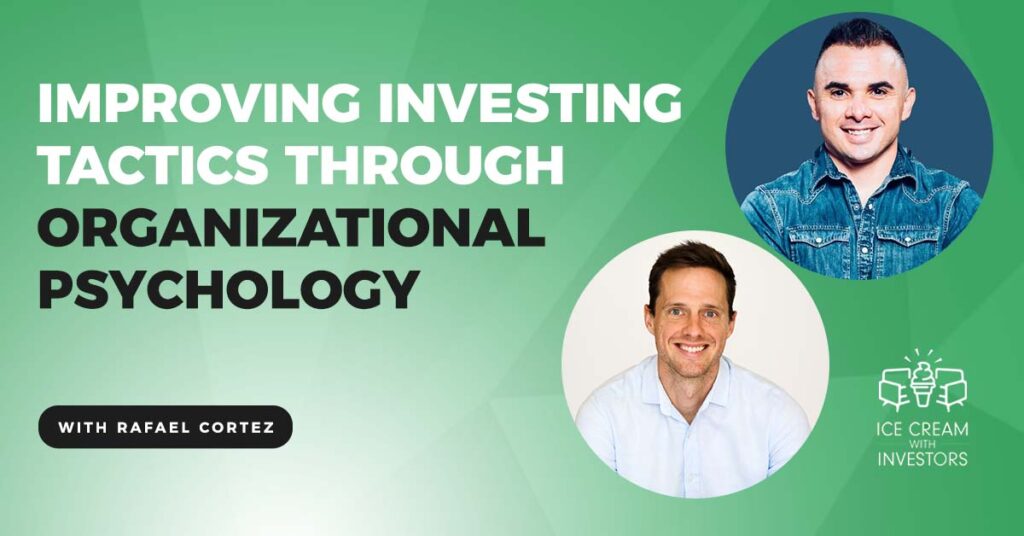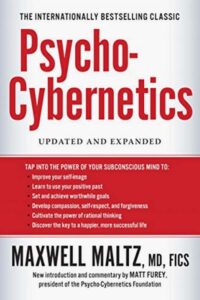A business cannot run well if its people cannot perform at their fullest potential. If you find people management a bit challenging and chaotic, organizational psychology can help you address such a serious issue. Business coach and organizational psychologist Rafael Cortez joins Matt Fore to discuss integrating a systematic and human-centric approach into your business-building strategies. He explains how to create deep relationships with your team to help them freely showcase their talents and skills. Rafael also discusses how to use the DiSC assessment profile to understand every person’s strengths and weaknesses, giving you a better idea of which responsibilities to give each team member.
—
Watch the episode here
https://youtu.be/2VDatyj0r2c
Listen to the podcast here
Improving Investing Tactics Through Organizational Psychology With Rafael Cortez
Rafael, welcome to the show.
Thanks for having me. It’s an honor.
We like to start with the difficult questions here. What’s your favorite ice cream?
I’m a Cookies and Cream guy.
I was at a baseball game in the Minor League and I saw Dippin’ Dots. I love Dippin’ Dots and they had some Cookies and Cream. I was waiting for it. I waited ten minutes in line for it and they were out.
I’m telling you, it’s in high demand.
Are you a cone or a bowl guy?
I’m a cone. It depends. I do both but one of my favorite spots is Yogurtini. I love that place. You go on then you create your own little ice cream, and throw a bunch of stuff in it. My base is always cookies and cream then I’ll drop fruits and all kinds of stuff into it. That’s a bowl. Everything else is a cone.
I like it. Tell our audience, what’s the scoop? What do you do now?
I’m a real estate investor, mainly. I own three different businesses. I’m an organizational psychologist, so I do a lot of coaching and consulting for general businesses. I also coach on real estate, wholesaling specifically. I own a real estate brokerage. I have a bunch of agents that do both sides. They do real estate investments and traditional, and then I own a fixed and flip business and wholesale business, which is Pulse Capital. It’s like the nutshell of the three businesses. The interesting thing is that they all talk together. In my head, it’s this one big business with a couple of different arms.
I can’t wait to get into the organizational psychology part of this and how you can use some of those tactics of what you’ve learned to build out your team, and how you integrate all this together. Before we get there, you didn’t start out in real estate. Take us back to your first time. Where did your real estate journey begin?
I was a firefighter when I was nineteen years old. I got my first exposure to anything outside of a W2 when I was talking to my captain. He was good at investing in different things and he planted the seed. I started thinking about entrepreneurship and having my own business. My first business was a non-emergency medical transportation business. I had that for years. I launched it when I was 21. I got my first paid client when I was around 23. It took a minute for the thing to get some traction and whatnot. It was a very interesting journey. I had that for eight years and sold that.
In the interim, I started looking at places where I could park some of the money that I was putting together. Back in high school and going through college, my thing was construction. I would go work at a concrete company, masonry company or framing company for the summer, and then do construction and have my own cash and that sort of thing.
I knew how to swing a hammer. I was like, “All right, cool. I’m going to flip a house.” It reverted back to old-school stuff. I went into it. I did okay. I didn’t lose some of that first deal, but it was an absolute learning experience. I started as a fixed flipper. It’s one of those things. You buy a house at a discount. I did everything wrong, honestly. From gauging what the repair costs were going to be to not hiring anybody and doing everything myself and running out of time on things. I survived on the deal because they bought it in cash and they didn’t leverage it. If I had had money like hard money on that thing or something like that, there’s no way I would have made money at all.
I like to say that I know plenty of people that have done no deals in real estate and plenty of people that have done millions of deals in real estate, but very few people that have done only one. If you cannot lose money in your first deal and learn through the process, it’s usually a pretty good start to your real estate journey.
I am not handy at all. I think that helped me scale some of my rental portfolios when I was in the single-family space because I had to learn how to hire contractors, listen and ask questions, and vet different contractors on whether something was going to cost what they said it was going to cost. When did you ultimately stop swinging a hammer and scale it from the CEO’s standpoint?
By my second flip, I wanted nothing to do with hammers and nails anymore. It was a lot. It took me about 5 to 6 months to flip that first property of just me having that thing and coming and doing work on it. I hired a couple of people. I hate painting, so I hired people to come and paint. I wanted to tackle everything else like the stupid things, “I’m going to resurface the cabinets in the kitchen.” That sort of thing. That would have taken somebody a weekend. It took me a month and a half. I was doing everything wrong.
In my head, I was wired for that. I was wired to do it. It’s what we do. I grew up with humble beginnings. I grew up in a mobile home, so I was used to working on things by myself. If I wanted a nice cabinet, I would make it nice. We would go buy something at a thrift shop and bring it back then make it nice. That was a norm in my head. I was like, “I’m going to flip this house.” Even though I was doing better with the transportation business, in my head it was still me going back to, “It’s what it’s supposed to happen.”
I found out that it’s not. Once you start leaking time for the sake of saving a little bit of cash here and there, it turns out to be a lot more expensive. I did this exercise where I sat down and started to take note of what my hour cost. What’s my hour worth? That was mind-boggling. It was mind-blowing because I started looking at the revenue that I was bringing in from the transportation business, and looking at my yearly income and all that stuff.
I quantify that to an hourly rate. Out of my time, how much is an hour worth? I looked at that thing and it was in the hundreds. I was like, “Holy crap. You’re telling me that every time I’m trying to swing a hammer, I’m literally wasting hundreds of dollars because I could be focusing my time on something else?” That was an instant game-changer for me.
I had a coach one time that said to do exactly that. Figure out what’s your hourly cost or what your productivity is per hour. Multiply it by two. Anything under that, you should hire out without hesitation. Anything up to 10X, you should be questioning from there. 2X to 10X, you should be questioning. Anything over 10X, you’d be lucky to work on those sorts of tasks. Go find those 10X tasks.
That was a total game-changer. I started learning as I went, asking questions and talking to other contractors and building my relationship that way. I started taking myself out of that space quick. I’m a believer that you have to know enough about everything that you’re tapped into, enough to be dangerous in it. Understand what’s going on. It’s not necessarily to be a master at the craft that you don’t want to be a master of.
As the CEO, you must understand what everyone in your team does. You don’t have to master every craft but be sure to have an idea of how they are basically done.CLICK TO TWEET
As a CEO or owner, you have to understand what everybody is doing and how the machines are put together because of our visionary roles. We come in and that’s the thing. At least at the level that I’m playing now, I still have the ability to do that kind of stuff, to be tapped in into the workings of the business. I love playing in that space, putting the machine together and then plugging people into it so they can run the machine. It’s coming from the lessons learned where I was spinning my wheels. I thought I was saving money but I wasn’t.
I thought I was doing things right by going to YouTube University. A thousand mistakes were made quickly. That helped me in the long run because I fail fast and fail often. It happened over a period of six months when I started doing all this activity in real estate and I learned a lot of things. Eventually, I pivoted and turned my main model into a wholesaling model as opposed to fixing and flipping. I still do fix and flips but I do it as a secondary now. I build the business in wholesaling and I have that going as the main business on the real estate side.
I was getting ready to say, I bet at some point in every flipper’s journey they realize that wholesalers are getting these deals before them, and choosing which deals they want to keep and which deals they want to keep for themselves and offload through a wholesaling process. At what point during your flipping career, was it after 10 houses or 15 houses, did you recognize that there was some value you could add in the whole selling space as well?
I was just signing documents. I didn’t even know what a settlement statement was. By the third house, I looked at the paperwork. It took a little bit of time to look at the settlement statement, then I saw a fee of $18,000 there. I was like, “What is this fee for $18,000?” I went to that guy that I talked to about the house. He told me straight up, he wasn’t trying to hide anything. He’s like, “That’s my wholesale fee. That’s my fee for finding you that property.” We did it in the form of an assignment. I was like, “You made $18,000 on this thing? How?” He broke it down after that.
I started looking into podcasts and listening to them. I look for mentorship right away. You either go work for somebody who is in the business and doing it or go get somebody who has already done it and have them teach you. Speed is money when it comes to our space. Fast implementation and that sort of thing. I did a couple of deals listening to podcasts and building up relationships and talking to people who I knew. After that, I started working. I sold my transportation business. A lot of things happened during that interim.
I sold my transportation business. I did pretty well on it. I started listening to the Flip 2 Freedom podcast with Sean Terry. Long story short, I end up working as an acquisition guy for Sean Terry because I wanted to learn the business. I stayed there for a couple of years. That’s where I built my learning curve. It got cut by ten years because of the exposure that I was getting to seller appointments. It’s a high-performance environment. For anybody who doesn’t know him, he’s a total rockstar when it comes to coaching and the whole selling space. I learned a lot during that process. It was imperative for me to come into a place that was going to challenge me, and then teach me at the same time.
I typically hear flippers say, Sell four, keep one.” When they start their whole selling journey, every five deals, they sell four and keep one for themselves. You mentioned the process of working for somebody to learn the ropes. You’ve developed a couple of frameworks on processes but also the criteria of a deal. I’ve heard you mention four things you need to know to make a deal happen. Would you mind walking us through those?
We’re talking specifically about wholesaling. It’s the action of finding discounted deals and talking to motivated sellers. That’s what it is. If you’re strictly thinking about wholesaling, you’re locking a deal. Meaning that you’re negotiating a deal below market value because there’s some type of need there. Either the property is super beaten up. There are time constraints. The property is in foreclosure, there’s divorce, or there’s something big that does not allow them to put it up on the MLS and sell it traditionally. That’s where selling through a cash offer comes in.
With that out of the way, for a deal to make sense, you have to look at the condition of the house. You have to look at the timeline, the motivation for them for selling, and then the price. The price has to make sense. We call it the four pillars, condition, timeline, motivation and price. Going into the condition, it’s going to be one of the things that allow you to see if there’s something that you can come in and then solve because of the structural problems.
The property is beaten up. It needs rehabbing. It’s a ton of work. The uglier, the messier, and the more beat up they are, the better. We look for ugly properties. The properties that nobody wants. I can’t tell you how many times we walked into a property where you feel like you need to throw away your shoes. It’s like, “This is money,” but it’s that kind of problem that we’re coming in to solve. There’s a stigma behind wholesaling.
A lot of people, when they hear the term wholesalers, they think of these people that are taking advantage of sellers. They’re stealing properties left and right and whatnot. I think because of the low entry barrier, people have taken advantage of that position in the past. In reality, we’re looking for a very small amount of the population. That’s where the work and the tenacity come in. We’re looking at anywhere from 3% to 5% of the people that want to sell that are going to be a fit to sell to us. It’s people who can’t put their property on the MLS. They can’t sell it traditionally. They don’t have the money for the repairs. They don’t have the time to wait. They got relocated.
We have a lot of people that come through probate. They have no idea. They inherited the property that’s on the other side of the country. They have no idea what to do with it and that sort of thing. At the end of the day, it comes down to solving a problem for that seller. The better we solve the problem and the bigger the problem, the more money we get on an assignment fee, but it’s an exchange of time and convenience for an assignment fee. It’s what it comes down to.
Real estate all comes down to solving a problem for the property seller. The bigger the problem, the more money investors get in assignment fees.CLICK TO TWEET
Two things I want to say there. One, I’m in sales in my regular W2 job, and that’s what I say sales is. It’s just solving problems. That’s what selling is. Somebody out there has a dire need for cash fast and the largest asset they own is a home. You are connecting them to folks that are looking to buy homes, regardless of condition, that has the cash.
The second thing I want to say is over the past five years, I’ve had this conversation with people that want to get into real estate. They don’t understand why a person would be a motivated seller when they could just post it on the MLS. We’re in some very choppy economic times here in the back half of 2022 as we go into 2023. I think the motivation will be around there now. Whether it’s jobs, moving for new jobs, divorce, relationship strains, and things like that. Are you seeing an uptick in the number of people that are looking to offload their properties now or motivated sellers? What has that done to your business now?
Especially because of the timeline. We’re talking about the timeline. We’re in the second half of 2022 and there are a lot of things happening. Inflation is 8.3 now. Interest rates have gone to the 5.6 range at the national average, give and take. What happened over the last couple of months is we see a dramatic spike in inventory.

Organizational Psychology: The second half of 2022 saw 8.3% inflation rate, and the interest rate is at 5.6 at a national average. This caused a dramatic spike in inventory.
Inventory wasn’t that strong at the beginning of the year. This is nationwide. I’m in the Phoenix market but it’s a little micro-sample of what happens at a national level. We’re usually ahead a few months of the rest of the country. This is for the people doing research out there on anything in terms of residential. Look at the Phoenix, Arizona market. Usually, those trends over the last ten years tend to blow up nationally. You’ll see something happen in Phoenix, then it happened nationally.
We saw a spike in inventory. Sure enough, the spike in inventory went up nationally. What happens is that people were putting properties up on the MLS, selling traditionally with an agent, and they were getting above the asking price. Those days are gone. That seller mentality of “I’m going to ask for the moon and the stars even if my property’s not worth it and I might still sell it” has slowly but surely faded over the last couple of months.
We’re seeing a lot of people being more open to negotiating and talking about, “What can we do with this property? Can we do creative financing deals? Can we do innovation-type deals? If the wholesale offer doesn’t work, how can we come in and structure this deal so it creates a win-win for both parties.” On the other side of the token on the buyer side, we’re having more of a challenge because buyers are a little bit more skeptical because days in the market are getting extended.
Buyers are thinking about that. Now, what we have to do is negotiate a property account for three months whole time, then factor that. I don’t know if you’re aware of this but the price points have dropped 2.5% across the board on a monthly basis. What we’re doing now is locking up a property for an investor. Somebody is going to come in and flip it. We’ll look at whatever the market value of that property is now, then shave off 10% automatically out of the gate for the sake of time and trends.
We’ll then start working on the wholesale offer number, so it has enough meat in the bones by the time the flipper is done with the property. There are different strategies that are coming into play here and we pivot as we go along with the trends. The sellers are getting the memo. There’s a lot more inventory. Now we have to do concessions. We have to do closing costs. We have to do things like this or sell cash on certain properties. It’s shifted a lot of the business models out there when it comes to wholesaling.
I’m so excited you said you would take the ARV and shave 10% off of it, then work backward from those numbers. A lot of the wholesaling lists that I’m still a part of and that I see go across my desk are not doing that now. I even told a guy who was trying to wholesale a package of his portfolio in Chattanooga, “You’ve got 2021 numbers in there at the beginning of 2022. You do not have 2023 numbers in there.” I’m glad to see you doing that. Are you only doing wholesale and flips in Arizona? Are you doing this across the country or in different markets?
We’ve tapped into a couple of different markets. Mainly, my backyard is my main market, so Maricopa County. I don’t do flips anywhere outside of this. It’s not my model. I’d rather move quick.
Why?
To me, it’s too distracting. The model works. I think we picked the level of headaches that we want and it’s by design. I’ve had the opportunity to flip in other places, but even if it’s a good juicy deal, I slide it over to one of my cash buyers and have them capitalize on that. I made some cash and move on to the next one quick.
I’m glad you said that. That’s probably the key to your success. It’s to be able to focus on that. I see great deals all over the country and people ask me why I don’t go to Indiana or Wisconsin or around this. I have a core thesis and a core competency. I don’t even know the first contractor in those markets to even try to be successful. Sorry to interrupt you there. I just wanted to highlight that saying no to the wrong things will help you accelerate what you say yes to.
It’s key. It’s a matter of focus. You create this business model. If you have enough time to tap into different things, mess around, and experiment on different markets, it’s fine. Now, that doesn’t factor into the picture that I have as far as the entire business model. It takes a lot of willpower for me to not look at the shiny objects, but then I think about it. I have a good set of buyers in Tampa. We’ve done a bunch of deals in Tampa.

Organizational Psychology: It is fine if you have enough time to tap into different things and experiment with different markets. But these have a little impact on your entire business model.
If I don’t have the ability to JV and partner up with somebody who I know, then we’ll do a split. I’ll provide the property. They’ll provide the fix, the management and all that stuff, which I do here in town for the most part. I wouldn’t even look at that project. I take the assignment and then move on to the next one. It’s part of that business model but it keeps it fluid. It keeps it moving. As far as markets, it’s Atlanta. We’ve done Texas and then Tampa.
One of the parts that I find super interesting about you is your background in organizational psychology. You have a number of different businesses that stand on their own but also intertwine together. To start this conversation, tell us what organizational psychology is, why you end up studying this, and what you find interesting, and we’ll go from there.
Organizational psychology is the study of people in the workplace. People in systems is what it comes down to. It’s business psychology but it’s understanding human behavior, then understanding systems and processes within any company or corporation and plugging them together, making them more simultaneously. You probably heard the adage of right butts and right seat type of stuff. That plays along with organizational psychology.
We all have different strengths and weaknesses. For example, if you’re a very introverted person and I put you in a PR role where you have to be out there and be the face of something and networking, it’s going to wear you out. There’s a lot of energy. Just like your body takes up energy when you go to the gym, our mind takes up energy when we’re adapting from one natural behavior to one required behavior.
Understanding that plays well into attrition, how long employees last in their seats and their roles, how well they perform and turnover. It’s huge on turnover. That’s one little aspect of it but understanding how to create or how to develop the systematic approach to building a business and plugging people into it makes sense. You can have a badass of a business that works very well, but if you don’t have the right people behind it or the right roles, it’s not going to run. It’s a matter of putting both of them together.
If you have a business, the first thing you got to ask yourself when somebody is having difficulties performing in their job is, are they in the right seat? Maybe, first of all, what’s going on in their personal life? Do they have something that’s pulling them away? You’d have to have the empathetic knowledge to go ask questions and make sure that you have a good enough relationship where they can express that freely. The second thing is, are they in the right seat? I have seen rockstars come through my teams through the days that have been in the wrong seat. When you put them in the right seat, all of a sudden, they are the rockstars they are.
It’s incredible how that works. You find where somebody thrives. Maybe somebody files an application for an acquisition role. In my opinion, there are certain elements that you got to have to be a good acquisitions rep. That includes social awareness, people skills, and a lot of things like that. A lot of soft skills play into that role. When you have somebody on dispositions, and I’m talking about wholesale here, the requirements are going to be different. You have to be good at a lot of the hard skills, which are software, spreadsheet, CRMs, communication, emails, and structured processes and systems.
You have different demands for each one of the roles but somebody submits an application because they saw acquisitions were available. You plug them in there without knowing that their best strength is going to be on the hard skills side of things because they like more of that isolated focused space as opposed to that people’s space. You’re starting off on the wrong foot and it’s expensive. Think about all the opportunities that are lost. It’s not just on payroll because we pay payroll on a regular basis then you have commissions from the deals that you get. Whatnot the stuff that you didn’t get because that person was not in the right role? You’re talking hundreds of thousands of dollars there.
How do you find out their strengths and weaknesses before you hire them? What have you done to implement that in your business?
I built assessments for internal purposes for my companies. I have targeted assessments for each one of the roles based on behavioral strengths. One of the fastest ways to figure out if somebody is going to be a fit or not is to have a decent sense of whatever that role requires, and then do a DISC test or DISC assessment profile. Tony Robbins has one that’s for free, TonyRobbins.com/disc.
It’ll give you strengths and weaknesses and talk about behavior, the approach on how to have a conversation with that type of person, and how you build them into your environment as a human being, not necessarily role specific. Understanding how people think is huge. When you connect that with understanding what the roles and responsibilities are, you can put two and two together. It’s one of the things that I go deep on.
I don’t implement a DISC assessment before I hire someone but I probably should because there’s a lot of value in understanding what drives that person, whether they’re the right person or not, and then how they’re going to interact with the people around you. We were chatting offline that you also have a coaching business where you help wholesalers or people that want to get in the business understand the process and scale their business. Can you talk a little bit about how organizational psychology has helped you coach people one-on-one as well?
It’s all human nature. We’re all in the people business. It doesn’t matter what you’re doing. At the end of the day, if you understand human nature, how to communicate with others, and how they communicate, a lot of those doors are going to be wide open. Think about sales. Your background is in sales. Normally, you think about sales and the standard thought is, “Negotiation. It’s friction. I’m going to negotiate this thing for this,” as opposed to having a fluid understanding of what’s being said and reading between the lines.
When you understand somebody’s behavior, meaning how they interpret information, what tonality you can use with certain people, and body language, how does that play into the conversation that you’re having with somebody? You fall into that space of understanding that goes way beyond words. Seven percent of communication takes place with words. Up to 70% is body language. The rest is going to be tonality. It’s crazy.
We’re in this conjunction of this communication process that it’s easy to miss if you’re not paying attention. Organizational psychology helps you understand how people think and make the connection between that, and what roles you need to be fulfilled in your company. Where can I place this person where they’re going to be thriving, not just performing and being a laptop with the pulse?
One of the things you said too is how a portion of our communication is done non-verbally as opposed to verbally. That’s why I have a general role that you should never read context into an email or a text or things like that. That’s your projection of what you think they meant, rather than their intended message. If you ever get a snarky text or a snarky email and you’re trying to figure out or you get frustrated by that, the best thing you can do is call that person and say, “Can you help me clarify what you’re trying to say here because I’m not understanding what you’re trying to say.”
A lot of times, leaving ego aside is going to be one of the biggest challenges because we’re going to identify whatever we want to interpret with our own glasses per se. In reality, how many people have you come across regionally? Think about regionally. If you’re talking to somebody from New York and you’re from the Midwest, Midwest people tend to be very warm. If you talk to somebody from New York, they may be in the exact same emotional state but one is going to sound like a jerk and the other one is very welcoming and homey.
It’s just different understandings. We all speak English but we have different languages when it comes tonality and to expression. That’s the human side. On the pragmatic side or the business systems and processes side, how can you create a business model that is LESS framework, Lean, Effective, Strategic and Simple? If I can incorporate those four things into my business or if I can make my business lean and all the actions that are being taken are not just efficient but effective, and they’re strategic and simple, people are going to adopt it.
It’s the framework that I look for in the business side, but it’s got to talk to that human element. Human capital is so underrated. I think we’re coming into an age where there’s more understanding of that and it’s bubbling up. People are understanding that now it’s important to matter in a business as opposed to getting a paycheck and to have that connection and a sense of impact and belonging as opposed to clocking in and clocking out on somebody’s payroll.
It is now more important for most people to be in a business with a sense of impact and belonging than clocking in and out on somebody’s payroll.CLICK TO TWEET
I work in technology, so there’s this big debate around artificial intelligence. Is artificial intelligence going to replace us or complement us? It’s this idea that they’re going to take jobs away from people and things like that. If we move down that pessimistic path and take that argument as true, the one thing that you could do to separate yourself in both business and personal life is to have an empathetic sense.
What technology will never be able to do is be empathetic or read into those emotions. It can understand where a process is breaking down and try to better that process, but it won’t be empathetic. That’s the one thing I go around telling everybody early in their career, “At the end of your career, you’re going to be complemented with a large amount of technology but it will never be able to be empathetic so go learn that skill now.”
Be a human.
Don’t be a jerk. Rafael, this is a fantastic conversation. I want to shift this now into our last round. We’re calling this the five toppings. Our first one is, what is your favorite book or what is a book that you’ve read recently that has given you a paradigm shift?
If you’re talking fiction, it’d be The Alchemist by Paulo Coelho. I love that book. It’s fiction but is it really? It’s one of those good fables. I love that book, and then Psycho-Cybernetics by Maxwell Maltz. It’s an amazing book on the image of self and self-belief. It’s a good book.
The first time I read The Alchemist, I was not a fan until the last twenty pages, and then it all came together. Maybe I read it at the right time in my life but it hit home hard.
It’s interesting. Certain chapters will speak to you. It was a game-changer book for me and it’s a story. That’s what’s so crazy about it.
Our second one is I believe that the person you become ten years from now is directly correlated to the habits that you have and the things you do every day. What are some of the things that you do every day?
I became a morning person. I made myself a morning person. I was not a morning person. I’ll wake up in the mornings. What my schedule looks like now is I wake up at 5:00 in the morning and go to the gym.
A cool byproduct of that is my son who’s fifteen years old goes to the gym with me in the mornings. We spend this hour and a half before he goes to high school. It’s our thing. He pushes me and I push him. He pushes me more than I push him. He just doesn’t know. It creates that bond and connection. I come back home, meditate, and journal. I read in the mornings. It’s my me time, but I do a mix of all that stuff.
I was pushing to have the straight block to meditate, the straight block to journal, and not get distracted or not interject things in the middle but it’s impossible, especially if you have family and there’s activity going on in your house in the morning. In the mornings, I have to wake up early in the morning, knock that out of the way, go drop off my son at the bus stop, then we have another conversation. I’d go drop my ten-year-old son off at 8:00 in the morning. That creates the block. In the spaces in between, I’m still doing my time. It’s my time involved with family connections. 9:00 AM rolls around and I’m ready to go.
That sounds like a perfect morning. Time with the family and for yourself. Our third thing is, what’s the best piece of advice you’ve ever received?
Be loud.
What does that mean?
This came from one of my good friends. It meant to stop doubting our own abilities for the sake of, “I don’t know if what I have to put out into the world is good enough. I know it’s working for me but I don’t know if it’s going to work for anybody else.” It’s second-guessing and creating that self-doubt. Being loud forces you to act at a different level or perform at a different level. It creates that self-reliance.
One thing for me, and this is being completely vulnerable or transparent, was validation. Anytime I did something, I would have to look for validations somewhere somehow, “I’m doing it right.” I had to get like a stamp on it from somewhere. Otherwise, I felt like I was off track. The crazy thing is that if you’re a real entrepreneur, 99% of the time, you have no idea what the hell’s going on.
You’re trying to figure things out. You’re following a process, putting a process together, and our abilities in that problem-solving skill set. Being loud about my vision, where I wanted to take the companies, where I wanted to create the impact that I wanted to create, especially with my students, and putting myself out there in terms of value, being on podcasts, YouTube, social media and all that stuff. Voicing my thoughts was a game-changer. That was huge.

Organizational Psychology: Being loud about your vision and the impact you want to create is truly a game changer.
Who gave you that advice?
Brent Daniels.
Our fourth one is, what are you most proud of in your life?
I’m very proud of my kids, honestly. They’re rockstars. From a self-indulging standpoint, I’m proud of clarifying my current purpose because it took me a lot of work to figure it out, which is to empower. Especially, growing up from humble beginnings, going through different stages of entrepreneurship, and tapping into different industries, it’s easy to get lost. I did get lost for a long time where I thought what mattered was going after that dollar, chasing the dollar, chasing the financial freedom, and all that stuff.
At the end of the day, what I wanted was to own my options. Once you hit that stage where you’re out of survival mode, what drives me? That was a question that I had to sit with for a long time. My outside motivation is done. I hit it. I’m not dying anymore. What’s going to wake me up in the morning? I sat with it. I thought about motivation and inspiration for entrepreneurs. What it does is empowerment. It’s a combination of everything. It’s being the change out there and having somebody else use you as a seed or a catalyst for their own change. That’s one of the things I’m the most proud of.
I want to be cognizant of your time but I got to ask. What exercises or how did you come to that clarification? If somebody is reading this now and they’re a little bit lost, and they’re trying to figure out what their clarifying moment is, what do you do to find that?
We’re dynamic beings. That’s the first thing that I had to understand. When people talk about purpose, at least every time, I would speak about purpose, it sounded like this lifelong thing. It’s like, “What’s my purpose? My purpose is something that I’m going to have when I’m dying and I’m 90 years old.” It’s not. We’re dynamic beings. We’re always evolving. Coming to the understanding that purpose evolves as we do was a way of making it a lot easier to consume.
My purpose right now is empowerment. I don’t know if my purpose is going to evolve to something else or something deeper in five years. At this point in time, that’s what brings me joy. That’s the keyword. It’s joy. It’s a smile on your face. If what you’re doing in the mornings or throughout your day is putting a smile on your face and it’s guiding you every step of the way into that familiar point, which is your purpose at this point in time to the person that you are now as a human being, you’re winning. Everything I do throughout the day in the brokerage, in the fix and flip business, wholesale business and coaching, everything points over to empowerment.
Every conversation that I’m having with somebody else, it’s an empowering conversation. I can tell you with confidence that nobody has had a conversation with me over the last ten years where I’m complaining about something and I’m falling into victimhood. It’s always empowerment. It’s because the clarity of purpose is there. It’s understanding that we’re dynamic beings. We’re going to change and the purpose is going to change. It’s going to evolve along with us. That’s one thing.
The other one is what brings you joy and what puts a smile on your face. We have this good indicator. We’re always looking at KPIs as business owners, Key Performance Indicators. We’re always like, “How many sales do we make?” What about our own human humanness KPIs? Joy is the biggest one of them. It’s not even happiness. It’s not bliss. It’s not trying out for success. It’s joy. If you have the ability to walk the day and 90% of the day is spent with a smirk on your face or a smile on your face, you’re in a state of joy. You’re winning. Take that to the bank and do more of that.
If you can spend most of your day with a smile on your face, you are in a state of joy. Take that to the bank and do more of that.CLICK TO TWEET
I’m so glad you talked about it. We’re going to have to nerd off on that in a different conversation at a different time. To summarize what I’m hearing, more important than anything is to give yourself grace. When you talked about the need for being validated, you came to a point where you gave yourself grace that you didn’t need to be validated and that things would change.
When you were talking about empowerment, you’re talking about you gained clarity on that. It’s okay if my goal right now is to empower people or be an empowerer or whatever the word would be there because that thing can change in twenty years if I want it to be. It’s what am I now, knowing that I’m okay, and giving myself some grace that things could change. Fantastic conversation. I’m going to give our fifth and last one. If you could sit down and eat a bowl of ice cream with anyone dead or alive, who would it be and why?
Da Vinci. The guy was so far ahead of his time. I don’t know if you’ve read anything about him but it’s the thought process the guy had. It was insane in so many different spaces. I identify with him in the sense of curiosity. I’m curious about a lot of things. I’m the guy that’s wondering how the 1968 Camaro engine worked. How do I code something and put a program together? How do flowers do their thing? Curiosity is a big asset that is not tapped into enough. Going back through history, he has been one of the few characters or personalities that I’ve looked at that had an insane amount of curiosity. You don’t have to be the smartest guy if you’re curious.
I love it. We are over 100 shows and I think that’s the first time somebody said Da Vinci, which now looking back on it, it’s random that no one has said that before.
He was a dude.
Blazing the trails over there. Rafael, fantastic conversation. I’m super happy that you came on and added a lot of value not only on what you’re doing in your business but on how we can look at the organizational psychology part of it as well. If people wanted to reach out and learn more about you, your coaching programs, and the things that you’ve got together, where’s the best place we can put them?
If you want to find out about the coaching program, go to REIWholesaling.com. I have a PDF breakdown of the entire process. You can download a PDF version of the thing there and get a bunch of information. If you want to reach out to me directly, I’m pretty active on social media @RafaelCortezCEO on Instagram. I also have a YouTube channel with a ton of content out there as well at Rafael Cortez CEO.
Rafael, thanks for being on the show.
Thank you so much. It was a blast.
Important Links
- Pulse Capital
- Flip 2 Freedom
- TonyRobbins.com/disc
- The Alchemist
- Psycho-Cybernetics
- REIWholesaling.com
- @RafaelCortezCEO – Instagram
- Rafael Cortez CEO – YouTube
- https://www.RafaelCortez.net/
- www.CEOPulse.com/affiliate
- https://www.LinkedIn.com/in/rafaelcortezceo/
- https://www.Facebook.com/RafaelCortezCeo/
About Rafael Cortez

Rafael Cortez is a real estate broker, investor, entrepreneur, and organizational psychologist. Founder of CEO Pulse LLC and a Real Estate Investment coach and podcaster with Wholesaling Inc.
He became one of the youngest firefighters in Yuma County at the age of 19, began his first entrepreneurial project and launched Netcor Transports LLC in 2007 (a non-emergency medical transportation business).
Rafael started his first business at 21 and launched his first company at age 23 and now invested in wholesale real estate.






